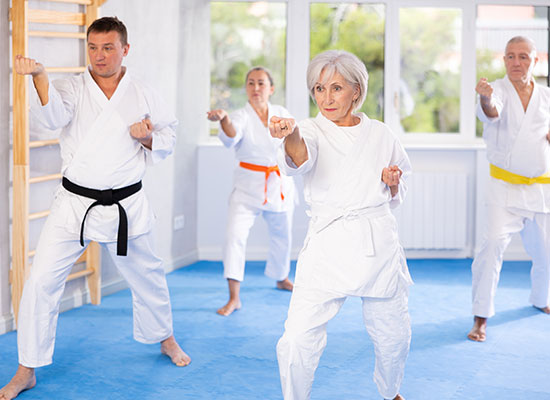 Contact
About Us
Articles
Home
Contact
About Us
Articles
Home

Aging gracefully is an art that encompasses far more than maintaining physical health; it's a holistic journey that integrates mental, emotional and social well-being. As we age, our bodies and minds undergo inevitable changes. However, how we perceive and manage these changes can significantly impact the quality of our later years. Adopting a positive perspective toward aging is not just about being optimistic; it's about recognizing the opportunities and wisdom that come with age and using them to lead a rich, fulfilling life.
In our society, there's often a focus on the negative aspects of aging – the loss of youth, the fear of dependency and the dread of isolation. Yet, aging can be a period marked by an increased sense of freedom, profound personal growth and deepened relationships. It's a time to celebrate the experiences that have shaped us, to embrace the present and to make meaningful contributions based on a lifetime of knowledge.
Aging gracefully isn't about denying the challenges that come with getting older; it's about facing them head-on with resilience, preparing for them proactively and finding joy and contentment in new ways of living. Whether it’s exploring new hobbies, connecting with loved ones or giving back to the community, the golden years can be a time of vibrant activity and deep satisfaction.
For seniors, engaging in regular physical activity is a cornerstone of health and well-being. Exercise is not just about maintaining fitness; it's crucial for preventing age-related issues such as muscle loss, decreased bone density and reduced flexibility. Ideal activities for seniors include walking, which is gentle on the joints while offering cardiovascular benefits, and swimming, known for its low-impact nature and ability to engage multiple muscle groups. Yoga, with its focus on balance, flexibility and mental wellness, is also highly beneficial for the aging population.
Seniors should select exercises that align with their current health status and physical capabilities. This might mean opting for gentler forms of movement, like tai chi or water aerobics, particularly for those with joint issues or limited mobility. Regular exercise can lead to significant improvements in daily functioning, from climbing stairs more easily to better balance, reducing the risk of falls. In addition, strength training, even with light weights or body-weight exercises, can help maintain muscle mass, which is crucial for overall mobility and health.

As we age, our dietary needs change, making it vital for seniors to focus on nutrition-rich eating habits. This involves choosing foods that provide the necessary nutrients without excess calories, which can be harder to burn off due to a naturally slowing metabolism. A diet rich in fruits and vegetables provides essential vitamins and minerals, while lean proteins, such as fish, chicken and plant-based options like beans and lentils, support muscle health.
Whole grains like oatmeal, quinoa and brown rice are important for digestive health and maintaining energy levels. Seniors should also ensure they stay adequately hydrated, as the sense of thirst can diminish with age. Drinking enough water, along with limited caffeine and alcohol intake, is crucial for overall bodily functions.
Portion control is another key aspect of healthy eating for older adults. As caloric needs decrease, managing portion sizes helps prevent weight gain and related health issues. Planning meals and paying attention to hunger cues can assist in maintaining a balanced diet.
Incorporating a variety of foods not only ensures a wide range of nutrients but also makes meals more enjoyable, which is an important aspect of eating well at any age. Consulting with a nutritionist or health care provider can provide personalized dietary advice to meet individual health needs and dietary preferences.
The importance of mental stimulation for older adults cannot be overstated, as it plays a critical role in maintaining cognitive health and overall well-being. Engaging in activities that challenge and stimulate the brain is key to keeping mental faculties sharp and may help in slowing down the progression of cognitive decline, a concern for many in their later years. Some ways to pursue mental wellness as we age include:
Seniors need to find mentally stimulating activities that they enjoy and can engage in regularly. Consistency in these activities is key to reaping the maximum cognitive benefits. Additionally, staying mentally active can contribute to a sense of purpose and fulfillment, enriching the quality of life in the golden years.

Effective stress management is a vital component of mental wellness. As individuals age, they may face unique stressors such as health concerns, financial worries, loss of loved ones or changes in their living situation. Managing these stressors proactively is crucial to maintaining mental health and overall well-being. Here are some suggestions on how to manage stress:
Managing stress is not just about reducing feelings of anxiety or worry. It's also about enhancing their overall quality of life. By incorporating these stress management techniques into their daily routine, seniors can enjoy a more relaxed and balanced state of mind, contributing to their overall mental and emotional well-being.
For seniors, nurturing and sustaining social relationships is crucial for emotional health and well-being. As people age, the risk of loneliness and isolation increases due to factors like retirement, the loss of loved ones or mobility issues. Active efforts to maintain connections with family and friends can significantly mitigate these risks. Regular visits with family members, lunch dates with friends or even casual meetups in community centers can provide much-needed social interaction.
In today's digital age, technology offers additional avenues to stay connected. Video calls, social media and messaging apps allow seniors to maintain close contact with their loved ones, even if they are geographically distant. This digital engagement not only helps in keeping up with the lives of family and friends but also ensures a sense of inclusion in their daily activities.
Engaging in community activities is another excellent way for seniors to foster social connections. Participation in local clubs, volunteer organizations or religious groups provides opportunities to meet new people with similar interests, fostering a sense of community and belonging. Such involvement is not only socially rewarding but can also give a sense of purpose and contribution, which is particularly important after retirement.
Volunteer work, for instance, can be a fulfilling way to give back to the community while staying active and engaged. Many organizations and charities welcome the wisdom and experience that seniors bring. Similarly, joining special interest clubs or groups – such as book clubs, gardening societies or art classes – can provide a platform for shared interests and learning new skills, further enhancing social interaction and personal growth.
Participating in community-based exercise programs or attending events at local senior centers can also offer social benefits. These activities provide a structured environment for seniors to interact, socialize, and build new relationships, enhancing their social network.
Overall, fostering social connections through maintaining relationships and community involvement is essential for the emotional and psychological well-being of seniors. It helps combat loneliness, promotes a positive outlook and enhances the overall quality of life during the golden years.

The pursuit of hobbies and interests plays a vital role in enriching the lives of seniors, offering opportunities for joy, fulfillment and a sense of accomplishment. Aging can be a perfect time to explore new passions or reengage with old ones. Picking up a new skill, such as learning to play a musical instrument, trying one's hand at painting or exploring the art of gardening, can be incredibly rewarding. These activities are not just recreational; they provide mental stimulation, promote dexterity and can even have therapeutic effects.
Joining hobby groups or clubs also offers the added benefit of social interaction. Participating in a knitting circle, a book club or a walking group allows seniors to connect with like-minded individuals, share their experiences and learn from each other. Such groups provide a supportive community where seniors can express themselves, share their passion and feel a sense of belonging.
The pursuit of knowledge need not diminish with age. In fact, seniors have a wealth of options for continued education and learning. Many community centers, colleges and universities offer classes specifically tailored to older adults, covering a wide range of subjects from history and philosophy to technology and the arts. These educational pursuits not only keep the mind sharp but also provide an opportunity for seniors to delve into subjects they’ve always been curious about or explore entirely new fields of interest.
The advent of technology has made learning even more accessible. Online courses and webinars allow seniors to learn from the comfort of their home, making education both convenient and adaptable to individual needs and schedules. Whether it's mastering a new language, understanding the basics of computer programming or participating in a virtual lecture series, the options for learning are limitless.
Engaging in educational activities offers more than just the acquisition of knowledge. It fosters a sense of achievement, keeps seniors mentally active, and can be a great way to connect with younger generations, bridging the gap through shared educational interests. Continued learning is a stimulating and rewarding way for seniors to stay engaged with the world around them, promoting a sense of purpose and intellectual growth well into their later years.
The journey of aging gracefully is an expansive and multifaceted one, encompassing much more than the preservation of physical health. It's a holistic approach that involves nurturing mental, emotional and social well-being. The way we perceive and adapt to the changes associated with aging plays a pivotal role in determining the quality and richness of our later years.
Far too often, society fixates on the negative aspects of aging, such as the loss of youth or the fears surrounding dependency and isolation. Yet, aging can also be a period replete with freedom, growth and deepened relationships. It's a time to celebrate life's experiences, to savor the present and to contribute meaningfully, drawing from a well of wisdom accumulated over a lifetime.
Aging gracefully is about facing the challenges of getting older with resilience and a proactive mindset. It's about finding joy and contentment in new ways of living, whether through exploring new interests, strengthening social bonds, or giving back to the community. The golden years can be a time of vibrant activity and profound satisfaction.
Regular exercise and healthy eating are cornerstones of physical health in old age, contributing to strength, mobility, and overall vitality. Mental wellness, achieved through intellectual activities and stress management, is equally crucial in keeping the mind sharp and resilient. Social connections, whether through family, friends or community involvement, provide emotional support and a sense of belonging.
Pursuing passions and hobbies, along with embracing continuous learning, adds a layer of joy and personal fulfillment to the aging process. These activities not only stimulate the mind but also provide opportunities for social interaction and self-expression. And finally, embracing technological advances helps seniors stay connected with the world and their loved ones, enriching their lives in countless ways.
Alliance America is an insurance and financial services company dedicated to the art of personal financial planning. Our financial professionals can assist you in maximizing your retirement resources and achieving your future goals. We have access to an array of products and services, all focused on helping you enjoy the retirement lifestyle you want and deserve. You can request a no-cost, no-obligation consultation by calling (833) 219-6884 today.


